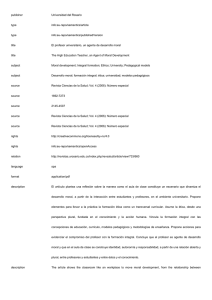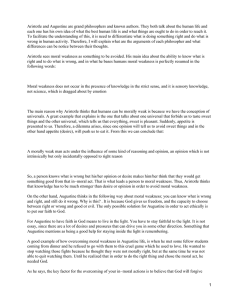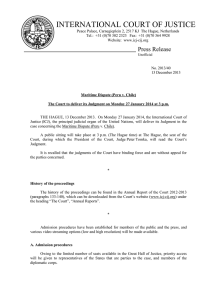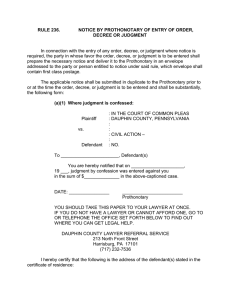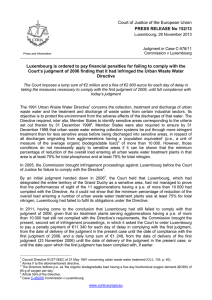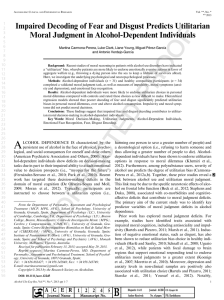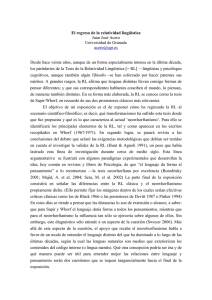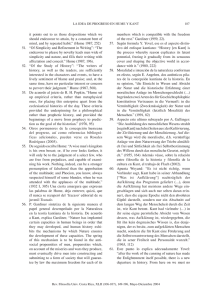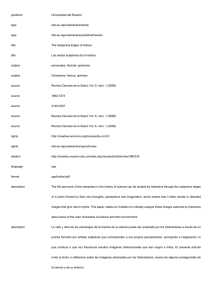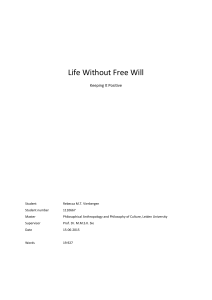Moral Judgment in States of Deliberative Equilibrium
Anuncio
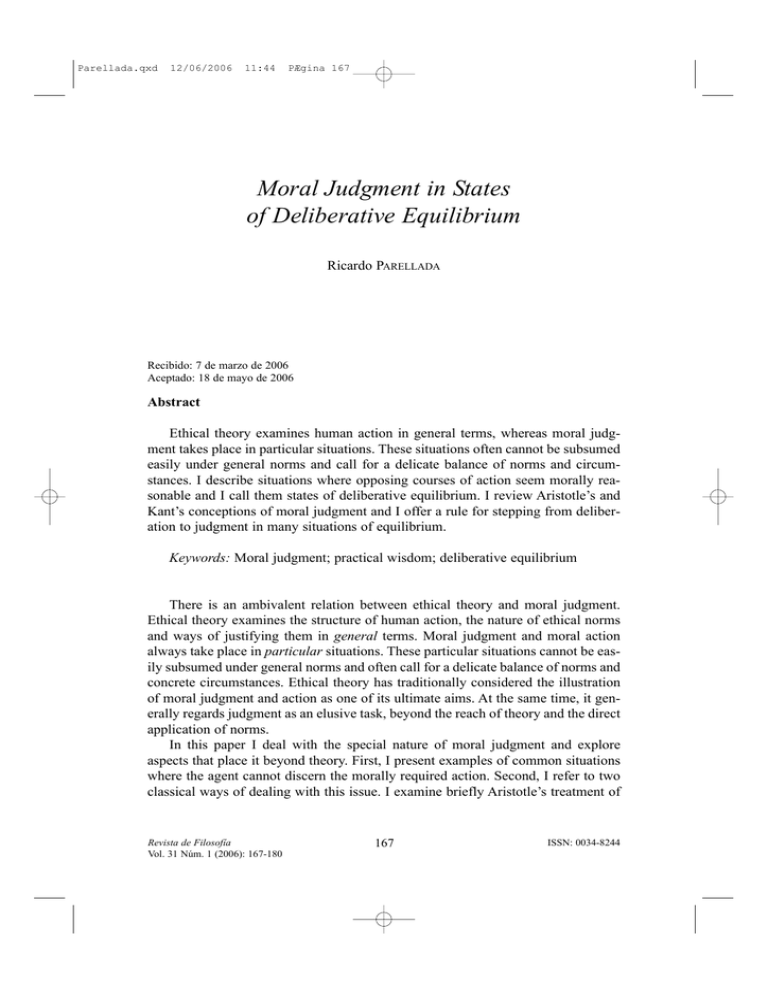
Parellada.qxd 12/06/2006 11:44 PÆgina 167 Moral Judgment in States of Deliberative Equilibrium Ricardo PARELLADA Recibido: 7 de marzo de 2006 Aceptado: 18 de mayo de 2006 Abstract Ethical theory examines human action in general terms, whereas moral judgment takes place in particular situations. These situations often cannot be subsumed easily under general norms and call for a delicate balance of norms and circumstances. I describe situations where opposing courses of action seem morally reasonable and I call them states of deliberative equilibrium. I review Aristotle’s and Kant’s conceptions of moral judgment and I offer a rule for stepping from deliberation to judgment in many situations of equilibrium. Keywords: Moral judgment; practical wisdom; deliberative equilibrium There is an ambivalent relation between ethical theory and moral judgment. Ethical theory examines the structure of human action, the nature of ethical norms and ways of justifying them in general terms. Moral judgment and moral action always take place in particular situations. These particular situations cannot be easily subsumed under general norms and often call for a delicate balance of norms and concrete circumstances. Ethical theory has traditionally considered the illustration of moral judgment and action as one of its ultimate aims. At the same time, it generally regards judgment as an elusive task, beyond the reach of theory and the direct application of norms. In this paper I deal with the special nature of moral judgment and explore aspects that place it beyond theory. First, I present examples of common situations where the agent cannot discern the morally required action. Second, I refer to two classical ways of dealing with this issue. I examine briefly Aristotle’s treatment of Revista de Filosofía Vol. 31 Núm. 1 (2006): 167-180 167 ISSN: 0034-8244 Parellada.qxd 12/06/2006 11:44 PÆgina 168 Ricardo Parellada Moral Judgment in States of Deliberative Equilibrium deliberation and judgment, and the line of thought that takes him to conclude that, in complex particular situations, moral judgment is the outcome of an intuition. I also deal briefly with Kant’s treatment of ethical casuistry. Under this heading he refers to rather specific situations, but tends to handle them in a general way. I consider his criticism of Aristotle’s doctrine of the mean, and his case that ultimate judgment and action are not a moral but a pragmatic matter. Finally, with aid of the initial examples, I offer a criterion for stepping from deliberation to judgment in many individual cases. This criterion has both a descriptive and a normative intent. It is meant to highlight an aspect of actual deliberation and judgment of ordinary agents, and it is presented as a morally compelling one in many situations. While concurring with the elusiveness and the intuitive nature of moral judgment, I believe the proposed criterion to be very relevant, especially in what I call states of deliberative equilibrium. These are situations where, after careful consideration, we end up regarding opposite courses of action as morally reasonable. 1. The difficulty of moral judgment As a first example, suppose we regard helping people as a moral duty. This general duty can have trivial, but also dramatic instances. Suppose a person has a close alcoholic relative. It is conceivable, in such a case, that this person has never invested a minute of his time in keeping his alcoholic relative company. Perhaps he has never tried to go with him to the doctor or even for a walk. We usually think there is something wrong with this attitude. We can also easily imagine the case in which a devoted husband or wife has spent two decades fighting courageously against the daily degradation of his or her spouse, trying to make life livable for their children, paying attention to the alcoholic’s needs and whims, never departing from his or her side. It is hard to see whether there should be a limit to the dedication given to such an ill and often selfish person, who is not only ruining his life, but also that of his closest family. It is comforting to know that the mean between steely coldness and blind devotion to the drunkard could be determined by a wise man, but this will not help much if we do not have one around. On the other hand, it is easy to see that absolute rejection of drunkards would not be acceptable as a universal law, whereas complete submissiveness to physically violent drunkards would not make a desirable generalization either. But these considerations do not seem to be of much aid when confronting a difficult personal situation. Nothing seems to be of real help for a hard individual choice. In a less dramatic case, suppose a professor has a professional duty, perhaps also Revista de Filosofía Vol. 31 Núm. 1 (2006): 167-180 168 Parellada.qxd 12/06/2006 11:44 PÆgina 169 Ricardo Parellada Moral Judgment in States of Deliberative Equilibrium a moral one, to respond to the demands of her students. If an attentive and gentle student needs some piece of advice or simply encouragement, it seems wrong on the part of the professor to ignore this demand completely. But some students unnecessarily draw personal and daily attention from their professor, regardless of her other duties and commitments. It seems legitimate not to spend precious time, each and every day, with such inconsiderate students. Although it is easy to consider the issue in extreme cases, there are plenty of situations where it is not easy to draw the fine line between attentiveness and the legitimate worry for one’s own time. Third, suppose we regard voting as a moral duty. Certainly, some people consider not voting as a moral duty, but this need not concern us here. We are not dealing with the content or the justification of norms, but with the difficulties of applying them in some particular instances. Suppose, then, a person regards voting as his duty. It would take him one hour to fulfill this duty, it is a bit cold outside, and he would rather spend his Sunday morning doing crosswords. As it happens, the previous evening, while trimming his nails, he also slightly cut his little finger, which is now hurting a bit two seconds every hour. If no other fact is relevant, nothing in his circumstances seems to override an easy application of the initial norm to his particular situation. Suppose another person also regards voting as her duty. This person has been ill all night, could only get a couple of hours of sleep, and actually has a high fever. It would also take her one hour to go to the polls, and the cold outside would certainly not do her any good. If these are the relevant circumstances, nothing seems to prevent the common sense conclusion that she should have some hot milk and stay peacefully in bed. Now, between these two cases, we can imagine plenty of intermediate situations. Beginning with the first person, we can ask ourselves: what if the little finger hurts five seconds per hour, or if it is more than just a bit cold, or if voting took him seventy minutes. Now considering the other person: what if she actually got three hours of sleep, or if her fever was not that high, or if voting took her fifty minutes. We can imagine plenty of different circumstances and situations between both extremes, including many in which the balance of the norm and the circumstances is not clear. The circumstances of the first person are irrelevant for the vote; the circumstances of the second person advise her to stay at home. But life is full of situations where the appeal of a prima facie duty and other duties or impending circumstances seems extremely close and difficult to weigh. We sometimes fulfill that duty, whereas at other times we do not consider it to be a duty any more. 169 Revista de Filosofía Vol. 31 Núm. 1 (2006): 167-180 Parellada.qxd 12/06/2006 11:44 PÆgina 170 Ricardo Parellada Moral Judgment in States of Deliberative Equilibrium 2. Judgment as an intuition Aristotle’s ethical writings offer insightful and balanced considerations on moral judgment. He openly points out the difficulties of moral judgment and action in some particular situations. We can keep our drunkard in mind. For in everything it is no easy task to find the middle [...]; any one can get angry –that is easy– or give or spend money; but to do this to the right person, to the right extent, at the right time, with the right motive, and in the right way, that is not for every one, nor is it easy; wherefore goodness is both rare and laudable and noble.1 Aristotle has a fine understanding of human moral psychology. The notion of practical wisdom (phronesis) is the key anthropological notion he resorts to in order to account for lucid judgment and due action. Practical wisdom is an intellectual virtue, which presupposes the direction of character towards worthy ends. The main tasks of practical wisdom, as an intellectual virtue, are deliberation and judgment in the light of those worthy ends rooted in character. But actual choice is ascribed by Aristotle to moral virtue, and thus to the appetitive function of the human psyche.2 Aristotle offers an appealing conception of the intertwining of intelligence and character in moral choice. His understanding of the intuitive nature of ultimate particular choices should be assessed against this psychological and moral background. But this is no doubt difficult [to hit the mean], and especially in individual cases; for it is not easy to determine both how and with whom and on what provocation and how long one should be angry; for we too sometimes praise those who fall short and call them good-tempered, but sometimes we praise those who get angry and call them manly […] But up to what point and to what extent a man must deviate before he becomes blameworthy it is not easy to determine by reasoning, any more than anything else that is perceived by the senses; such things depend on particular facts, and the decision rests with perception [aisthesis]. So much, then, is plain, that the intermediate state is in all things to be praised, but that we must incline sometimes towards the excess, sometimes towards the deficiency; for so shall we most easily hit the mean and what is right.3 According to Aristotle, the mean is not only the object of an intuitive perception, but it is to be found sometimes in excess, and at other times in deficiency. Moreover, as Aristotle puts it elsewhere, the mean is “relative to us” and is determined “by that principle by which the man of practical wisdom would determine it”.4 This is a delicate way of pointing at the elusiveness of judgment. To despise Nicomachean Ethics, II, 9, 1109 a 24-28. For a detailed exposition see Parellada (2005). 3 NE, II, 9, 1109 b 14-27. See also VI, 11, 1143 a 19-b 16, especially b 3-6. 4 NE, II, 6, 1107 a 1-2. 1 2 Revista de Filosofía Vol. 31 Núm. 1 (2006): 167-180 170 Parellada.qxd 12/06/2006 11:44 PÆgina 171 Ricardo Parellada Moral Judgment in States of Deliberative Equilibrium the drunkard or to be blindly devoted to him seem both unfair, the former toward the drunkard, the latter toward his relatives. Similarly, to neglect students or to give any of them constant attention also seems unfair, either to the students or to the teacher. But where is the mean? There is no rule, says Aristotle, but the judgment of the wise man can be a good guide. The indeterminacy of moral judgment can also be illuminated by Aristotle’s treatment of justice: legal justice is correspondence with a rule, but true justice or equity demands deviation from it. What creates the problem is that the equitable is just, but not the legally just but a correction of legal justice. The reason is that all law is universal but about some things it is not possible to make a universal statement which shall be correct. In those cases, then, in which it is necessary to speak universally, but not possible to do so correctly, the law takes the usual case, though it is not ignorant of the possibility of error. And it is none the less correct; for the error is not in the law nor in the legislator but in the nature of the thing, since the matter of practical affairs is of this kind from the start […] For when the thing is indefinite the rule also is indefinite, like the leaden rule used in making the Lesbian moulding; the rule adapts itself to the shape of the stone and is not rigid, and so too the decree is adapted to the facts.5 There is no actual formula or criterion for individual choice in hard cases. But seeking the better way of handling issues and cultivating moral dispositions seems the right track to balance and moderation. Even though no rule can tell us whether or when to leave the drunkard, whether to respond to every demand of a student, whether to cast a ballot or stay in bed, Aristotle’s account of judgment as an intuition seems wise and meaningful, and can foster a desire for the mean that cannot be conceptually grasped, but can be attained by the wise man or woman. 3. Judgment as a pragmatic search The other historical moment I want to consider is Kant’s ethical thought. He also acknowledges the difficulty of judgment in particular cases, and he says that in order to deal with it one needs to go into casuistry. But, according to Kant, casuistry is not actually part of ethics. Rather it is woven into it in a fragmentary way and is added to ethics only by way of scholia to the system.6 NE, V, 10, 1137 b 11-32. The Metaphysics of Morals, trans. by M. Gregor. Academy edition, vol. VI, 411, Anm. Kant’s most significant considerations on moral judgment belong to this work, while he dedicates his Groundwork of the Metaphysic of Morals to the fundamental criterion for the assessment of ethical norms, the categorical imperative, and the Critique of Practical Reason to its rational justification. 5 6 171 Revista de Filosofía Vol. 31 Núm. 1 (2006): 167-180 Parellada.qxd 12/06/2006 11:44 PÆgina 172 Ricardo Parellada Moral Judgment in States of Deliberative Equilibrium Kant’s treatment of moral virtue and moral judgment starts from a radical critique of Aristotle’s doctrine of the mean. His main point is that the difference between virtue and vice is not a matter of degree, but a matter of principle: The distinction between virtue and vice can never be sought in the degree to which one follows certain maxims; it must rather be sought only in the specific quality of the maxims [their relation to the law]. In other words, the well-known principle [Aristotle’s] that locates virtue in the mean between two vices is false. Let good management, for instance, consist in the mean between two vices, prodigality and avarice: As a virtue, it cannot be represented as arising either from a gradual diminution of prodigality [by saving] or from an increase of spending on the miser’s part –as if these two vices, moving in opposite directions, met in good management. Instead, each of them has its distinctive maxim, which necessarily contradicts the maxim of the other.7 According to Kant, not only Aristotle’s principle, but also the various ancient sayings that praise moderation contain very shallow wisdom.8 As we have seen, Aristotle’s doctrine of the mean is intended to reflect the elusiveness of judgment, and he takes the mean to depend upon the agent, to entail sometimes excess or deficiency, and to deviate from strict lawfulness. To Kant’s mind, however, the Aristotelian principle and the ancient sayings display very superficial wisdom precisely because they do not offer a principle for distinguishing virtue from vice. As he says a few lines below: “For who will specify for me this mean between the two extremes?” He thus considers Aristotle’s principle to be useless, tautological, or a merely pragmatic rule with no moral significance.9 His critique can be better assessed with the aid of his own examples. If a vice is to be distinguished from a virtue, the difference one must recognize and explain is not a difference in the degree of practicing moral maxims but rather in the objective principle of the maxims. The maxim of greedy avarice (prodigality) is to get and maintain all the means to good living with the intention of [using them for] enjoyment. The maxim of miserly avarice, on the other hand, is to acquire as well as maintain all the means to good living, but with no intention of [using them for] enjoyment, (i.e., in such a way that one’s end is only possession, not enjoyment).10 Since the maxim is different, says Kant, virtue and vice are contradictory oppoMM, Ak VI, 404. Kant mentions: medio tutissimus ibis; omne nimium vertitur in vitium; est modus in rebus, etc.; medium tenere beati; insani sapiens nomen habeat aequus iniqui, ultra quam satis est virtutem si petat ipsam. For their location in ancient literature, see M. Gregor’s edition, p. 205, note, and Rovira (2002), p. 241. 9 For a thorough analysis of these three objections, see Rovira (2002), pp. 241-244. 10 MM, Ak VI, 432. 7 8 Revista de Filosofía Vol. 31 Núm. 1 (2006): 167-180 172 Parellada.qxd 12/06/2006 11:44 PÆgina 173 Ricardo Parellada Moral Judgment in States of Deliberative Equilibrium sites, and there can be no gradual transition from one to the other. As he puts it in another example, the difference between truthfulness and lying is contradictory, and there is no middle ground. The moment where Kant acknowledges the possibility of degrees is in the fulfillment of the duty. The duty of truthfulness can be met with candor or reticence, and there is a certain amount of latitude between these contrary extremes. According to Kant, it is natural to seek the mean between them, but that is not a moral, but a pragmatic search without moral content. For both duties of virtue have a latitude in their application (latitudinem), and judgment can decide what is to be done only in accordance with the rules of prudence (pragmatic rules), not in accordance with rules of morality (moral rules).11 Since the difference between virtue and vice lies entirely in the principle of action, and latitude belongs only to its pragmatic application, the mistake in the latter will be a mere fault (peccatum), but not a vice (vitium). Kant quotes Horace: “it is a foolish wisdom, equivalent to wickedness, that seeks to be virtuous beyond the proper measure”. And he takes this verse to be “utterly false”, for “really to be too virtuous –that is, to be too attached to one’s duty– would be almost equivalent to making a circle too round or a straight line too straight”.12 Now, in my opinion, Kant’s critique highlights important points and is useful to complement Aristotle’s insights. However, it falls short of being decisive, and it entails a degradation of moral judgment into a pragmatic matter that runs up against moral experience. It is true that the difference between plain virtue and plain vice can sometimes be described as actions with opposed principles and intentions, which make them into different kinds of actions. Aristotle himself states that there are many wrong actions as such, which are not to be conceived of as opposing extremes to virtuous action. Examples of these wrong actions are envy, adultery, theft, murder.13 But the problem of decision in hard cases remains untouched. If we think again about our initial examples, we can admit that extreme cases, at least in part, respond to different principles. In the first case, despising the drunkard in order not to waste time, and total devotion to him out of cowardice, despite harming children, correspond to rather different maxims. Both actions differ from the firm purpose of balancing attention to him and to others. Once we focus on the moral intent, we can certainly say that we are on the right track, and we sometimes think that we can do no more than seek the best solution. Now, we are not usually comforted by this thought. Often we not only want to MM, Ak VI, 433 note. MM, Ak VI, 433. 13 NE, II, 6, 1107 a 12-14. 11 12 173 Revista de Filosofía Vol. 31 Núm. 1 (2006): 167-180 Parellada.qxd 12/06/2006 11:44 PÆgina 174 Ricardo Parellada Moral Judgment in States of Deliberative Equilibrium get the purpose right, but also the action. Intention is essential for morality, and Kant is usually credited for having stressed this point most clearly. Kant contends that, once we get the maxim and its purpose straight, there can be no conflict of moral duties and finding the mean is a pragmatic endeavor.14 However, in the cases of moral uncertainty we are considering, I believe that the problem of judgment and decision continues to have moral significance after the purpose is right. This would speak against Kant’s contention that the problem of judgment is ultimately pragmatic. The moral significance of striving to act well even after the purpose is virtuous can be seen for the following reasons. First, the difficulty of moral judgment is not diminished by the fact that we want to follow the right maxim. And we describe it as a problem not only of judgment, but of moral judgment. The experience of morality seems to concern both right intentions and the search for a right action. Of course the wife wants to care both for her alcoholic husband and for her children and herself. But the tragedy lies in the fact that she is forced to draw a line when attention to the man entails too much harm and injustice to the kids and to her. In a similar, but less dramatic way, outright neglect of students and neglect of other duties because of students certainly respond, as Kant would say, to different maxims. The same can be said about the extremes of not voting because of a small cut or going to vote with too high a fever. But the wide range of intermediate situations seems to offer a wide space for moral implication. Second, we do regard those who are able to attain the mean in a wise way as having not only keen pragmatic intelligence, but also, as Aristotle would put it, moral vision and character. And this means that the search for the mean has a truly moral significance. Perhaps the best way to illustrate this point is Aristotle’s understanding of the interdependence of practical wisdom and moral virtue. As I have pointed out above, according to Aristotle judgment is the work of the understanding through the intellectual virtue of practical wisdom, but there can be no practical wisdom without moral virtue. In Kant’s picture, once intention is right (the task of virtue), judgment is a pragmatic task. In Aristotle’s picture, once intention is right (the task of virtue), judgment is the task of the understanding through practical wisdom. But there is no intellectual capacity of practical wisdom without its being anchored in, and fed by, moral virtue. The workings of practical wisdom presuppose moral virtue throughout, and it does not seem right to call them pragmatic. For these reasons, although the principle of action is essential, the search for the right action, the fine line and the elusive mean –which is sometimes a tragic search– seems a truly moral search. It is certain that we are primarily responsible for the maxim and its purpose, but if getting the mean right did not have a fully moral 14 MM, Ak VI, 224. See also Nussbaum (1983), p. 205. Revista de Filosofía Vol. 31 Núm. 1 (2006): 167-180 174 Parellada.qxd 12/06/2006 11:44 PÆgina 175 Ricardo Parellada Moral Judgment in States of Deliberative Equilibrium dimension, the road to hell would not be so widely paved with good intentions, as conventional wisdom puts it in various languages. Hell is not just a pragmatic matter. This discussion is also significant for another moral problem: the so-called phenomenon of moral luck. This problem arises when moral judgment seems essentially determined by outcomes which are not under the agent’s control. Allegedly, moral judgment is very different in the cases of murder frustrated by luck and actual murder, or in the cases of negligence in looking after a child, should she drown or not. The phenomenon of moral luck is usually taken to undermine the determination of the morality of action by intention, and Kant is brought up as the favorite illustration of this position.15 Although I cannot argue this in full here, in my view most instances of the phenomenon of moral luck are highly questionable. On reflection, I think we do not believe that morality depends on luck, but that our moral judgment, for example, on frustrated murder rejoins our judgment on actual murder. Intention is essential for morality, but I see a difference between moral judgment and moral luck. My claim would be that, prospectively, the process toward moral judgment has moral significance beyond intention, whereas, retrospectively, moral judgment focuses mainly on intention. On reflection the so-called phenomenon of moral luck mostly vanishes. On the other hand, Kant’s treatment of virtue and moral judgment casts further light on the functioning of the categorical imperative. As it has been pointed out in recent contributions, despite the broader treatment of the Groundwork and the Critique of Practical Reason, the maxims of action are to be conceived of not only as quite specific, but also as including the particular ends of the agents.16 It is interesting to note that, in the Doctrine of Virtue in the Metaphysics of Morals, Kant raises the question whether suicide could be regarded as permissible for a person bitten by a rabid dog, who ends his life in order to avoid harming others when he goes mad. Although he just raises the question, he does seem to imply that committing suicide in order to end some grief and committing suicide in order not to harm people are completely different maxims, which would entail different outcomes when universalized. For the same reason, lying in order to save lives seems to function as a universal law, whatever Kant protests.17 The categorical imperative should thus consider specific situations. Nevertheless, ultimate particulars and specifics do not appear to belong to the universalization test, but rather to demand being balanced against norms in a different 15 The two articles that have prompted recent discussions bear the title “Moral Luck”: Nagel (1979) and Williams (1981). 16 For example, Herman (1993), p. 134 f.; Korsgaard (1996), p. 57 f. 17 Kant, “On a Supposed Right to Lie from Altruistic Motives”, Ak VIII, pp. 423-430. See chapter 5 of Korsgaard (1996): “The right to lie: Kant on dealing with evil”. 175 Revista de Filosofía Vol. 31 Núm. 1 (2006): 167-180 Parellada.qxd 12/06/2006 11:44 PÆgina 176 Ricardo Parellada Moral Judgment in States of Deliberative Equilibrium way. Indeed, outright spite of drunkards is surely to be rejected as a universal law, as well as outright neglect of children because of drunkards. In the same vein, professors should rebuff neglect of students because of research, while students should avoid inconsiderate demands on a teacher’s time. We should reject not voting because of a small cut, or going to the polls despite severe illness. But is the universalization test of use in intermediate situations in which we strive after a delicate balance?18 In his treatment of casuistry in the Metaphysics of Morals, Kant describes situations that are more specific than those he deals with in the Groundwork and the Critique of Practical Reason, such as committing suicide when bitten by a rabid dog. However, he does not really account for the moral relevance of hard individual choice. He either simply asks how should action be determined in a very specific situation; or he says that it is just a pragmatic matter.19 4. Deliberative equilibrium and moral judgment Let us consider again our initial examples. They are intended to illustrate the difficulty of finding the reasonable mean and of drawing the line. With the aid of norms and the careful consideration of particulars and circumstances, we sometimes reach a point in which the balance of judgment will not tilt. Life is full of all sorts of situations: those in which this norm applies, those in which that norm does, and those in which it is hard to draw a line or pass a judgment. In such moments, we usually understand equally well that the person involved judges and acts one way or the other. I believe that we understand equally well that the devoted wife gives her drunkard one more chance or starts to think about herself. There are cases in which it seems equally reasonable to make an extra effort with the students or to tell them politely that you have other duties. In those cases, it seems equally reasonable for the students to go once again to their teacher’s office or to refrain from doing so. Similarly, it would then be equally reasonable to make an additional effort to vote or to stay at home. I propose to call these situations states of deliberative equilibrium.20 18 Barbara Herman argues that the only task the categorical imperative procedure can perform is actually providing “predeliberative presumptions”, in Herman (1993), p. 147 f. 19 The former in Ak VI, 404 Anm., 426, 434, 454; the latter in 433 Anm. 20 Although this idea has been inspired by John Rawls’ notion of “reflective equilibrium” (general adjustment of principles and judgments), it has a very different purpose and content. It has more resemblance with Martha Nussbaum’s notion of “perceptive equilibrium”. See Nussbaum (1990), pp. 168-194. Nussbaum argues forcefully for the importance of the literary imagination for a full understanding of particularities of persons and their choices. With the notion of “deliberative equilibrium”, I want to highlight another aspect of moral action: the states in which opposing judgments or decisions seem morally reasonable. Revista de Filosofía Vol. 31 Núm. 1 (2006): 167-180 176 Parellada.qxd 12/06/2006 11:44 PÆgina 177 Ricardo Parellada Moral Judgment in States of Deliberative Equilibrium Needless to say, the states of deliberative equilibrium are arrived at after very careful consideration of all relevant factors, including the personal needs and characteristics of the people involved. Depending on the case, we would expect persons deliberating to arrive at equilibrium in different ways, and to dedicate to the process reasonable amounts of energy and time. Whether or not to leave the drunkard certainly deserves more attention and time than deciding whether or not to vote when feeling half sick. My point is that there are situations, whether grave or not for life, in which we experience this moral equilibrium of pros and cons after due reflection. I believe this to be a fact of moral life closely related to the difficulty of moral judgment. Two criteria seem to me to be quite relevant for deliberative equilibrium. First, in the spirit of generalization, deliberation demands that we abstract from our personal lot. Deliberation demands that we try to realize what we would think and feel if we were the wife of the drunkard, her mother, her son, her neighbor, or the drunkard himself. We are expected to put ourselves in the place of the students and the professor; in the place of the sick person and her spouse, who had planned to go to the polls with her.21 Second, after a certain point, it seems that small changes in the situation –such as the drunkard getting drunk once more– will not affect our considering it as one of deliberative equilibrium. It is as if the nature of the case entailed equilibrium. When the case is hard, we hope we can pronounce warm words with love or friendliness. A judgment on the person facing the choice seems wrong… no matter what she finally decides. The idea of equilibrium can precisely account for the fact that there is a clear range in which we are to keep away from judging other persons’ moral plights. Nevertheless, our moral life is very subtle, and refusing judgment and action in bad cases can surely be an act of cowardice or unfairness toward other people. It is true that a great deal of practical wisdom is needed in order to determine the sides and the middle ground. But this is common to any description of deliberation and judgment. A good deal of practical wisdom is required before judgment in the Aristotelian view, and a good deal of moral sense is also required for maxim description in the Kantian view. For these reasons, I take the previous description of deliberative equilibrium to correspond to an actual feature of our moral life, whether in view of important situations, such as how to handle an alcoholic, or trivial ones, such as whether to go to the polls when feeling half sick. The problem of moral judgment arises precisely because of this feature of moral life. As we have seen, according to Aristotle there is no rule for ultimate choice in these cases. The whole person –with his or her reasoning, memories, and emotions– is involved. The decision that would be taken by the wise man or woman is better described as the outcome of some sort of intuition. 21 Of course, this is the venerable moral intuition behind the golden rule, Leibniz’s principle of the place of another, Kant’s categorical imperative, etc. 177 Revista de Filosofía Vol. 31 Núm. 1 (2006): 167-180 Parellada.qxd 12/06/2006 11:44 PÆgina 178 Ricardo Parellada Moral Judgment in States of Deliberative Equilibrium Kant also acknowledges that there is no rule for ultimate choice. But, although he also praises the cultivation of moral character, he deprives hard choices from moral import: if the maxim is good, the difficulty is a pragmatic one. Now, my proposal is that there is indeed an important rule for judgment. This rule does not apply in all kinds of situations, but it does in a very important class, those in which the perspective of different agents makes a difference. It is not an intuition, but a rule. It can be put in words and concepts, and can be very useful for those of us who cannot rely on the insights of practical wisdom, for the simple reason that we have not attained this state yet. On the other hand, it is a truly moral rule, not a pragmatic one. I believe that our common experience demands our moral involvement not only in our maxim of choice, but also in the transition from deliberation to the judgments and actions urged by life. All persons are equal before moral laws and before the rule of law. But I believe that we are compelled to consider agents unequal in a sense before moral judgment. I believe the golden rule of moral judgment to be a principle of inequality. I take this rule to be deeply embedded in our moral sense and to call for an immediate passage from deliberation to judgment. It would read somewhat as follows: If you are in a state of deliberative equilibrium, that is, if after due reflection upon a moral choice you consider opposite decisions to be morally reasonable, then be demanding with yourself and indulgent with others. This rule of moral judgment is not at the same level as the moral rules that are difficult to weigh against each other in view of specific circumstances. These moral rules have positive or negative content: do not harm, take care of children, look after the ill, attend students, respect people’s time, participate in elections, etc. As we have seen with a few examples, we arrive at equilibrium when, after balancing norms and circumstances, we consider opposing courses of action to be reasonable and morally justified. The rule of judgment I have in mind does not apply when we are reflecting explicitly or implicitly upon norms, circumstances and moral choice. This is why it is not at the same level as those moral norms. My point is that it is not a rule for deliberation, but a rule for judgment. It applies after we arrive at deliberative equilibrium, which I take to be a very common experience in the complex and rich moral life of ordinary agents. The rule of moral judgment is not a rule for the judgment that this or that is an instance in which this or that norm applies. It would be vain to talk of rules of judgment in this subsumptive sense, because we could then ask for the rule for the application of the rule of judgment and so on. Moral deliberation surely entails many judgments of this sort: this person is so and so, that action would be a case of so and so, etc. On the contrary, the rule of moral judgment does not assert that this or that is a case of so and so. My proposal is twofold: (1) moral deliberation, which no Revista de Filosofía Vol. 31 Núm. 1 (2006): 167-180 178 Parellada.qxd 12/06/2006 11:44 PÆgina 179 Ricardo Parellada Moral Judgment in States of Deliberative Equilibrium doubt includes many judgments of subsumption, often entails equilibrium; and (2) we are compelled to undo equilibrium by being more demanding with ourselves than with others. The rule of judgment I propose does not apply in all cases of moral indecision because it is not always a question of being demanding or not. But many moral decisions in ordinary life concern this kind of reflection; the Aristotelian idea of locating virtue in a mean, for instance, responds in great measure to this kind of concern. In these cases, the application of the rule is not difficult. If you have an alcoholic relative, and you think you have already done everything you could possibly do, and you honestly believe that it would be reasonable both to give him one last chance and to start putting some distance between you and him, then give him one last chance. But, under the same circumstances, if you are not the person in such situation, tell her from the bottom of your heart that she has already done everything that could be expected of her. In rather trivial cases, suppose that you think that in a certain situation it would be reasonable for a professor both to dedicate more time to a student or to save time for other things. Then, if you are the professor, spend a little more time with the student, whereas, if you are the student, simply realize that your teacher has already been very helpful and generous with her time. Finally, suppose a person is half sick and considers whether or not to leave the house in order to vote. If you are that person, then why not say: “I’m not feeling that bad. Let’s cast a ballot and come back right away”. But, if you are her spouse: “Come on! Take some hot milk and stay at home reading the paper. I will be right back for lunch”. What is the justification of this rule of moral judgment? I cannot provide one. This article has dealt with the difficulty of moral judgment. After reviewing Aristotle’s and Kant’s approaches, I have described what I call the phenomenon of deliberative equilibrium, and I have argued that in many situations agents are compelled to judge and to undo equilibrium by being demanding with themselves and indulgent with others. Why so? So far I have only tried to show the plausibility of this rule and to illustrate the way it works. Whether it can be rationally justified or not is another story. So far I would only claim that this rule of moral judgment in states of deliberative equilibrium is as pervasive, as appealing, and as difficult to justify as the idea of impartiality and related criteria for moral norms such as the golden rule or the categorical imperative. References ARISTOTLE (1980): Nicomachean Ethics, trans. D. Ross, revised by J. L. Ackrill and J. O. Urmson, Oxford, Oxford University Press. HERMAN, B. (1993): The Practice of Moral Judgment, Cambridge, Mass., Harvard University Press. 179 Revista de Filosofía Vol. 31 Núm. 1 (2006): 167-180 Parellada.qxd 12/06/2006 11:44 PÆgina 180 Ricardo Parellada Moral Judgment in States of Deliberative Equilibrium KANT (1902 ff.): Gesammelte Schriften, Berlin, Preussische bzw. Deutsche Akademie der Wissenschaften. KANT (1991): The Metaphysics of Morals [1797], introd., trans., and notes by M. Gregor, Cambridge, Cambridge University Press. KANT (1797): “Über ein vermeintes Recht aus Menschenliebe zu lügen”, in KANT (1902 ff.), vol. VIII, pp. 423-430. KORSGAARD, C. (1996): Creating the Kingdom of Ends, Cambridge, Cambridge University Press. NAGEL, T. (1979): “Moral Luck”, in T. NAGEL, Mortal Questions, Cambridge, Cambridge University Press. NUSSBAUM, M. (1983): “Reply to Richard Wollheim, Patrick Gardiner, and Hilary Putnam”, New Literary History, 15(1), pp. 201-208. NUSSBAUM, M. (1990): “Perceptive Equilibrium: Literary Theory and Ethical Theory”, in M. NUSSBAUM, Love’s Knowledge, New York, Oxford University Press, pp. 168-194. PARELLADA, R. (2005): “Aristotle’s Theory of Practical Wisdom”, The Modern Schoolman, 83(1), pp. 1-18. ROVIRA, R. (2002): “¿Una sabiduría insulsa? Sobre la crítica de Kant al principio aristotélico de la mesotes”, Isegoría, 27, pp. 239-249. WILLIAMS, B. (1981): “Moral Luck”, in B. WILLIAMS, Moral Luck. Philosophical Papers 1973-1980, Cambridge, Cambridge University Press. Ricardo Parellada Dpto. de Filosofía I. Metafísica y Teoría del Conocimiento Facultad de Filosofía Universidad Complutense de Madrid [email protected] Revista de Filosofía Vol. 31 Núm. 1 (2006): 167-180 180
